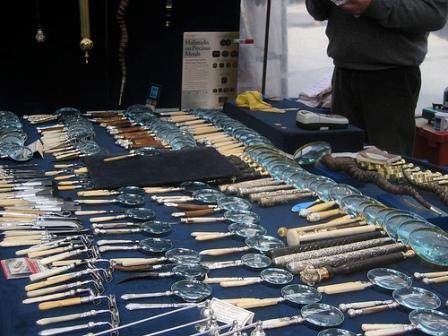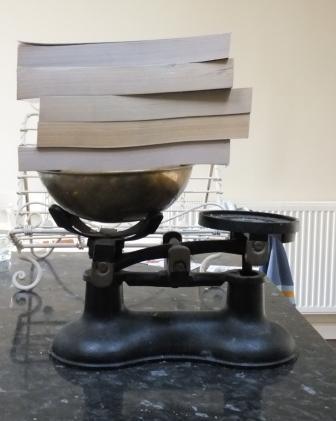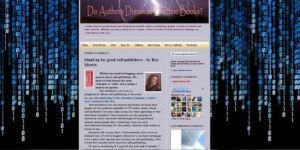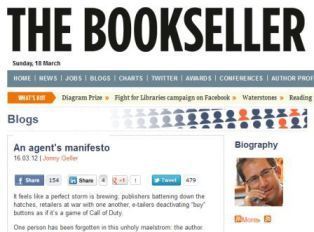Roz Morris's Blog, page 98
April 8, 2012
Final edits – what do you look for?
 When your novel is as familiar as the sight of your two hands typing, what do you miss?
When your novel is as familiar as the sight of your two hands typing, what do you miss?
I always find that when I've got the plot watertight, the physical consistencies sorted, there's another pass I need to do to make sure I don't lose the reader. I'm now making final tweaks to my second novel, Life Form 3, after an extensive rewrite and I thought I'd share the kinds of change I'm making before it goes back to my agent.
Making sure we stay with the main character #1
There are points where I haven't allowed the reader a beat to catch up with the main character's reaction to something important. While I don't want to slow the pace down or overstate, there are moments when the reader expects a beat before the next line of dialogue or action. So every time there's a significant revelation, I'm asking myself have we got a reaction?
Making sure we stay with the main character #2
The novel is third person, although the main character is in every scene. But sometimes when the action is centred on other characters we need to be reminded of his presence or he can seem like a passive observer. Or it might dislocate the reader by looking like I've drifted to a different point of view. So if, for instance, several characters are talking and my main character doesn't have a line of dialogue or needs to listen to them, I add a beat of reaction from him.
 Making dialogue bookish, not filmic
Making dialogue bookish, not filmic
When I write dialogue, I envisage it as a scene in a movie. For some dramatic scenes, I had the pauses and reactions in my head. On the page, the reader doesn't have my head movie, so this can look sparse and the eye slides off it too easily. Also, this can be quite a distanced way to see a scene. Where I had sparse dialogue, I included the reader more by fleshing out some details.
Culling the fancy stuff
Can you hear that screaming? That's me, drowning my darlings. I'm wailing at least as loud as they are. I am removing metaphors and similes that, although lovely, interfere with the reader's immersion in the scene.
For instance, the main character finds an abandoned underwater room. On the floor are dead, dried fish – 'like' (I wrote) 'soles that have dropped off shoes'. Yes it's lovely, but the scene has so much sensory detail already that this stops the flow, like a record jumping a groove (I hope you'll allow me that one). Out it goes (with me weeping a tear). This is what ruthless revision means.
Adapting my style for the demands of the book
In case you're wondering, I didn't even realise I'd written two novels with the word Life in the title. And no, I'm not planning a whole series of them. In fact, Life Form 3 has given me quite a different set of challenges from those in My Memories of a Future Life – and one of the biggest was writing style.
The main reason is the setting. Life Form 3 is set in a strange, unusual place, so I have had to curb my natural love for the flamboyant and weird. It's all very well to describe the familiar in an unfamiliar way – that's fresh and poetic. In My Memories of a Future Life I revelled in it. But in Life Form 3, the story is already flamboyant and extravagant. To add more weirdness, in terms of descriptions and comparisons, gets confusing. The moral? If you're already describing the unfamiliar, don't gild the lily by adding more oddness. Keep something simple.
We all do our last passes differently – what do you look for? Share in the comments!
For more tips on novel-writing, from first twinkling idea to final fix, you might like my book Nail Your Novel: Why Writers Abandon Books And How You Can Draft, Fix and Finish With Confidence or my multimedia course with Joanna Penn aka The Creative Penn
Thanks for the pic BryanKennedy
Sign up for my newsletter! Add your name to the mailing list here.








April 3, 2012
‘The last days of Nazi Germany did not play out to Wagner, but sentimental hits about love and hope’ – Leslie Wilson, The Undercover Soundtrack
 My guest this week drew on the music of 1930s Germany to flesh out her story of a girl who hides her Jewish boyfriend from the authorities. For some of the scenes, she even wrote lyrics in the style of the time. The novel, Saving Rafael, has been nominated for no fewer than four awards and Leslie Wilson is talking about its Undercover Soundtrack on the red blog today
My guest this week drew on the music of 1930s Germany to flesh out her story of a girl who hides her Jewish boyfriend from the authorities. For some of the scenes, she even wrote lyrics in the style of the time. The novel, Saving Rafael, has been nominated for no fewer than four awards and Leslie Wilson is talking about its Undercover Soundtrack on the red blog today








'The last days of Nazi Germany did not play out to Wagner, but sentimental hits about love and hope' – Leslie Wilson, The Undercover Soundtrack
 My guest this week drew on the music of 1930s Germany to flesh out her story of a girl who hides her Jewish boyfriend from the authorities. For some of the scenes, she even wrote lyrics in the style of the time. The novel, Saving Rafael, has been nominated for no fewer than four awards and Leslie Wilson is talking about its Undercover Soundtrack on the red blog today
My guest this week drew on the music of 1930s Germany to flesh out her story of a girl who hides her Jewish boyfriend from the authorities. For some of the scenes, she even wrote lyrics in the style of the time. The novel, Saving Rafael, has been nominated for no fewer than four awards and Leslie Wilson is talking about its Undercover Soundtrack on the red blog today








April 1, 2012
How to get ideas for stories – be gullible

Be open to oddness: BBC TV Panorama's infamous April fool hoax, the spaghetti trees of 1957
I'm currently doing final edits on Life Form 3 – at least I hope they're final – so while I meditate about commas, I thought I'd rerun this. It wasn't originally written for April 1st, because I am gullible all year round. You'll probably agree it's a good thing I decided to stay in today.
I am hopeless at spotting a fib. The other day I was at the hairdresser having the red refreshed. Instead of my usual contact lenses I was in glasses, which have to come off while my locks are being daubed. I was listening in a thick myopic fog while my hairdresser, who is Spanish, was telling me about Christmas traditions in Madrid. They were quite charming and I repeated them in wonder: you put out gifts on January 6th for the Three Kings, including water for their camels? Wow – I love that.
She might have been kidding, but I would never have seen any ironic winks or smiles because I couldn't see beyond my own eyelashes. The rest of the stylists in the salon and their clients might have been sniggering through their capes, agog for what I would believe next. If they were, I don't mind. I was having a great time because I liked the story.
I have always been hopeless at spotting a fib. If you tell me something whacky that sounds interesting, I will find a reason why it is plausible. So a glass of water left out for the Wise Men's camels makes perfect sense to me, because it has story logic, and in my head I've joined the narrative dots.
 As storysmiths, the extraordinary, the ironic and the surprising are our currency. Part of our job is to invent the logic that gets from A to bizarre – or the other way around. Good stories are about big changes, interesting journeys, the unexpected.
As storysmiths, the extraordinary, the ironic and the surprising are our currency. Part of our job is to invent the logic that gets from A to bizarre – or the other way around. Good stories are about big changes, interesting journeys, the unexpected.
If a straitlaced friend tells me she has taken up burlesque dancing, the last thing on earth I'd say is 'you're joking'. I'd swallow it because I'd think what a surprising and refreshing turn her life has taken, how wonderful it is that she has conquered her stage fright, shyness, objections to female exploitation and previously voiced disapproval of skimpy feathered costumes. I will think: 'she must have needed it – I wonder why?'
So I am A1- gullible. But I've far outgrown being embarrassed by it. It's served me well as source of stories.
Do you value the strange? Have any personality traits that may seem laughable or embarrassing, but that you feel help you as a writer? Share in the comments!








March 31, 2012
A typewriter with no letter 't' – interview at Jason's Spina Bifida Journey
 Jason Bourne, in the non-fictional world, blogs about everything from cancer, sport, spina bifida, spirituality, music, the USA, love, leukaemia, food and friends. He also likes to collect authors from time to time and I'm honoured that he wanted me to guest on his Author Roundtable feature this week. We delve into my first urges to write, including the part played by a typewriter with a disadvantage that didn't stop it having a full and productive life… The full interview at Jason's blog
Jason Bourne, in the non-fictional world, blogs about everything from cancer, sport, spina bifida, spirituality, music, the USA, love, leukaemia, food and friends. He also likes to collect authors from time to time and I'm honoured that he wanted me to guest on his Author Roundtable feature this week. We delve into my first urges to write, including the part played by a typewriter with a disadvantage that didn't stop it having a full and productive life… The full interview at Jason's blog

March 27, 2012
'This wonderful, startling alchemy when music meets the writer's brain' – The Undercover Soundtrack, James Scott Bell
 My guest this week on The Undercover Soundtrack has perhaps the longest playlist yet. He keeps a collection of mood tunes to feed his muse, categorised as 'suspense, heart and inspiration'. He's bestselling suspense author and writing coach James Scott Bell, and he's sharing his writing playlists, in a very fine hat, on the red blog
My guest this week on The Undercover Soundtrack has perhaps the longest playlist yet. He keeps a collection of mood tunes to feed his muse, categorised as 'suspense, heart and inspiration'. He's bestselling suspense author and writing coach James Scott Bell, and he's sharing his writing playlists, in a very fine hat, on the red blog








March 25, 2012
Some novels should be written slowly
 How long does it take to write a novel?
How long does it take to write a novel?
Here's a typical post I've been seeing a lot lately. 'A few hundred words a day add up to several thousand a month – which will let you bank a good two or three novels a year.'
We're not counting the first book, of course. Then, you were running not just before you could walk but before you even learned to tie your shoes. Your novels after that will obviously be faster, but how fast? Two or three novels a year? Whole novels, finished, filleted to perfection?
If a goal like that turns you hysterically italic, then relax. It makes my serifs curl too. Not all novels can – or should – be written fast.
I've done fast writing. One year when I was ghosting, I knocked out four entire novels. (There they are on the scales, plus the one I started next.) I had the characters, it was a well trodden genre.
My own novels take me aeons by comparison.
I had the idea for My Memories of a Future Life in the 1990s when I was hopelessly unable to do it justice. A decade later I wrote it properly, which took at least a year of mining and quarrying. It wooed an agent, I did more edits and I hoped for another round before it was published. In the end I became my own publisher – diagnosed the last tweaks it needed and nuked 50,000 words. A lot of that time, of course, was learning curve. But My Memories of a Future Life could not have been written in four months.
The novel I'm revising again, Life Form 3, took more than a year. If you've been knocking around this blog for a while you might remember my anguished posts when it tested my faith quite sorely. I've now got great notes from a publisher who identified some sticky spots that I agree on. And finding the solutions has taken me three months.
 Three months. In the alternate universe where I write like the clappers, that's the time taken to write – and finish – three-quarters of a novel.
Three months. In the alternate universe where I write like the clappers, that's the time taken to write – and finish – three-quarters of a novel.
Although we do aim to finish our books, not fiddle forever, I worry that we are too obsessed by speed. It's as if all writers are being encouraged to aim just for quantity – 'I'll have a pound of novels, please'. My writing pace isn't unusual; I recently finished reading The Lessons by Naomi Alderman and was heartened to see a four-year gap between novel 1 and novel 2. She marinates even longer than I do.
You do what's right for your material, your muse and your market. A thriller designed as an airport read is probably not going to get much better if you spend a year honing every paragraph. Series are faster too – you know your characters and where you're going, so half the work is done for you already. A more literary, thoughtful work takes discovery. I sometimes worry that all I've got is muddle, and no model to tell me how to put it together. But with time, it comes.
If you're well tuned to your audience and your genre, you can turn a novel out efficiently – but that doesn't always mean fast.
Are you a fast writer or a slow writer? Do you feel pressured to write too fast?
Sign up for my newsletter! Add your name to the mailing list here.








March 20, 2012
'In that song I finally started to see the character who would introduce my story' – The Undercover Soundtrack,MJ Rose
 My Undercover Soundtrack author this week was struggling to begin her novel when her musician husband handed her a CD containing just one track – a piece he'd composed especially to show her the way. The novel is The Book of Lost Fragrances, the author is MJ Rose, and you can read more about this evocative, romantic mystery – and hear the song written especially for it – on the red blog now
My Undercover Soundtrack author this week was struggling to begin her novel when her musician husband handed her a CD containing just one track – a piece he'd composed especially to show her the way. The novel is The Book of Lost Fragrances, the author is MJ Rose, and you can read more about this evocative, romantic mystery – and hear the song written especially for it – on the red blog now








Stand up for good self-publishers – post at Authors Electric
 I'm sick of seeing knee-jerk reactions to self-publishers, dismissing us as slushpile rejects, literary no-hopers, copycat dross, self-indulgent narcissists, vanity by another name. If that gets you riled too, you might like my latest post at Authors Electric, where we are having an awfully good rant…
I'm sick of seeing knee-jerk reactions to self-publishers, dismissing us as slushpile rejects, literary no-hopers, copycat dross, self-indulgent narcissists, vanity by another name. If that gets you riled too, you might like my latest post at Authors Electric, where we are having an awfully good rant…








March 18, 2012
Why do authors get treated so badly?
 'One person has been forgotten in this unholy publishing maelstrom: the author.' That's London literary agent Jonny Geller, from Curtis Brown, writing today in The Bookseller.
'One person has been forgotten in this unholy publishing maelstrom: the author.' That's London literary agent Jonny Geller, from Curtis Brown, writing today in The Bookseller.
In a piece he titles 'An agent's manifesto' he says: 'The author is not an object a publisher has to step over in order to achieve a successful publication.' Someone needed to say this and thank goodness he has.
Any author who has knocked around the publishing industry has hair-raising stories of bad treatment. Everything is usually fine if we keep their heads down and do as we're told. But if we get out of our boxes, we suddenly meet unreasonable amounts of disrespect.
Battle lines
Typically this happens if we want changes to a cover or a blurb. Or we object to a title change. Or we make suggestions about the ebook release or the marketing plan. Suddenly we are treated dismissively, told we're 'only the author', told to put up and shut up.
Publishers cannot change anything without the author's say-so, but they don't want us to know this. (Even though it's probably in the contract.) And if we raise it, the standard tactic is not to discuss, but to bully the writer into agreeing by telling them publication will be delayed by a year or two, possibly indefinitely.
Now, having worked in publishers I know how important deadlines are. I know everything needs to run like clockwork. I know that publishers have not just one book to deal with, but twenty at least, plus all the other stuff that comes with working in a company. But they wouldn't treat any other supplier or professional that way. Just authors.
Jonny Geller again: 'If an author has a problem with the cover, blurb, copy or format, then something isn't right.'
It is common, behind the scenes, to hear editors talk about authors with undisguised loathing – not just individual ones who may be difficult, but all of them, authors as a breed. There is a culture that authors must not be listened to.
The real work
They seem to think that because they do some editing and proofing they've done all the proper work, and the author was a slapdash child who spewed up a half-baked mess. That's because the author had just spent months or even years locked in a silo with the book. We had to invent it, from nothing but ideas. The manuscript the publisher sees has another nine-tenths of work and tears below the waterline. If we put it aside and saw it with fresh eyes, we'd see a lot of those problems too (not all of them, but a lot). So no, the publisher didn't do all the work.
Is it because they think they could write too, if only they had the time? Everybody says that. We're used to it.
All the glory
Is it because writers seem to get all the glory? Most of us don't get within a light year of glory. And if we do, we've earned it. Publishers get paid a salary, reliably every month. Writers work for several years on an idea and all we can guarantee from it is a lottery ticket that probably won't pay back. In almost any other business environment, the one who puts in most risk gets the most reward. Try asking a venture capitalist for seed capital and see how much of your company they want for it.
Thumb-twiddling creatives
Is it because we're uncontrollable creatives? That's what brings publishers new, wonderful things to sell. Jonny Geller again: 'Remember, we don't have a job without authors … Authors who are valued, understood, appreciated, included, nurtured and spoken to like adults will experience a phenomenon called Trust. Trust breeds loyalty; loyalty means longevity; longevity means sales.'
Heavens, we want our books to be a success. We want to work with professionals who will help that to happen. We are grateful for good guidance and support. But we want to work in an atmosphere of mutual respect.
Thanks for the pic, Lydiashiningbrightly
Agree, disagree, add your experiences? The floor is yours…
I'm planning a newsletter! Add your name to the mailing list here.













